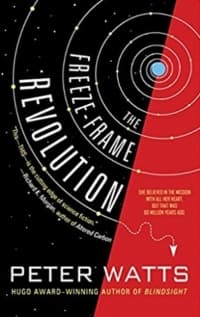
Estimated reading time: 7 minutes
Short Summary
Peter Watts has won a number of awards for his tremendously original science-fiction stories, and few exhibit this quality with the same aplomb as his novel The Freeze-Frame Revolution. It follows a protagonist trapped on a starship with the intent of creating a massive human uprising. The only problems? He’s only awake one day out of a million, his potential allies keep changing from one shift to the next, and he’s facing an enemy who never sleeps, can see and hear everything. Is a successful revolution even possible under these circumstances, or is it yet another pipe dream for desperate humans?
Table of contents
Wayward Asteroid of Peter Watts
There are certainly many words which can be used to describe the human race throughout its history, but I believe “crafty” is most certainly at the front of the line. Time and time again have people been able to subvert all expectations, defy all odds, and overcome circumstances deemed completely impossible. More often than not, it’s a trait exhibited by the countless masses of people throughout human history who have been able to overthrow tyrants and dictators, despite the evil men’s best efforts to keep everyone under their thumb.
In Peter Watts‘ The Freeze-Frame Revolution, a little pocket of humanity will have to make use of every single ounce of ingenuity it could ever be able to muster to start an uprising in the worst possible conditions anyone could imagine. The story takes place in a future where a crew is travelling inside a hollowed-out asteroid which basically serves as their starship. Their mission is travel their way around the galaxy, birthing wormholes here and there back to Earth so as to create a sort of galactic mass transit system.
The crew on the ship is governed by an AI with some limitations, and they all sleep for thousands of years at a time in suspended animation. Their wakefulness only lasts for days, as long as is necessary to get the job done. While our protagonist seems happy with the status quo and was perhaps even bred for this, there are other crew members who aren’t too happy with their seemingly eternal voyage.
An air of revolution begins brewing in the air, though naturally the question arises: how exactly does one stage an uprising under the thumb on an all-seeing AI who truly believes it is doing what’s best for you? Once again, the time comes for humanity to put on display the power of the brain and the will, their capability to defy the worst luck of all time.
Snippets of Tomorrow
To begin with, I just want to take a moment to laud Peter Watts for the brilliance of his concept and the premise he creates for the story to develop. While uprisings and revolutions have long been studied in fictional literature, I can’t really think of anything (off the top of my head at least) which comes closer to the premise we are given in The Freeze-Frame Revolution.
It all starts with the world-building, and while it does take up a few pages and perhaps prevent the story from moving along quickly, I feel it has its rightful place in the novel. The world we see is shown from the perspective of our human crew, and seeing as how they are only awake for short periods of time and sleep for long stretches, we too only get glimpses of this distant future.
Watts presents enough curious details about the world to get our imagination rolling, without ever giving too much away, making The Freeze-Frame Revolution feel like it might be the set-up for a sequel set in the same universe. As a matter of fact, the atmosphere in this great future where humanity can make wormholes is quite claustrophobic, with the plot taking place almost exclusively inside that hollowed asteroid.
In turn, the story shows its colours as being more of a character-driven experience than anything else, using the science-fiction backdrop to create the sort of outlandish premise the author really wanted. Personally, I don’t find that to be a problem at all, mostly because the characters themselves carry the show quite confidently.
We get to know them all quite profoundly by the end of it, and our protagonist undergoes a very realistic and tangible arc in his worldviews, relatable in all of his flaws and lessons. Personally, I also found the AI itself to be fascinating in its own regard, more precisely in how it interpreted its own mission and treatment of the crew… it was almost reminiscent of a delusional cult leader.
You might just decide that one life lived on your own recognizance is better than a million unremembered births.
― Peter Watts, The Freeze-Frame Revolution
The Complexity of an Impossible Mutiny
Moving on from the world and the characters in it, there remains the matter of the plot itself, and personally-speaking, this is without a doubt one of the more unique science-fiction premises I have encountered out there. The show is set relatively early on for a true battle of wits as our protagonist tries to find a way to outsmart an all-seeing AI who knows his every move and even sees through his eyes. It’s quite riveting watching him trying to craft the perfect plan step by step, alongside co-conspirators he might never actually be able to meet.
One aspect which I believe helps this novel never to feel stale or boring is Peter Watts‘ writing ability. Even though he often discusses complicated matters, his language remains extremely simple, concise and accessible, even when he’s educating us on the laws of physics governing black holes. As a result, the story of The Freeze-Frame Revolution moves along at a relatively quick and aggressive pace while still finding the time to probe the world and the characters’ minds.
Unfortunately, I do feel this did make the book feel rather short, and in the afterword Peter Watts does acknowledge this was meant to be a novella, even though he did tiptoe into novel territory. There are some truly clever moments here and there which I’m certain very few of you will ever see coming, and while the ending does come somewhat abruptly, it remains a fulfilling finale. In other words, it’s a short and fast story with not enough time to explore everything, no matter how concise the writing may be.
| PAGES | PUBLISHER | PUB. DATE | ISBN |
|---|---|---|---|
| 192 | Tachyon Publications | June 12 2018 | 978-1616962524 |
The Final Verdict
With all being said and done, The Freeze-Frame Revolution by Peter Watts is without a doubt one of the more engaging and original science-fiction stories I have read recently, despite its relatively short length. It has a very unique premise, excellent character study and a curious future for us to ponder about. If you enjoy science-fiction stories which centre on characters and the exploration of concepts, I highly recommend you give this book a try.

Peter Watts
Peter Watts is a Canadian science-fiction author as well as a former marine biologist with a PhD obtained from the University of British Columbia from the Department of Zoology and Resource Ecology. His literary career began with the renowned 1999 novel Starfish and his 2006 novel Blindsight was nominated for the Hugo Award.
He has also won a number of other awards, including the 2010 Shirley Jackson Award for Best Short Story for penning The Things as well as the 2010 Hugo Award for Best Novelette earned by his short work titled The Island.

